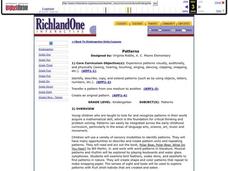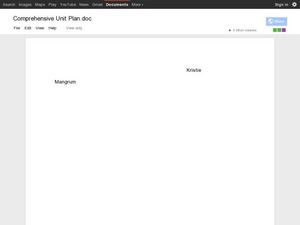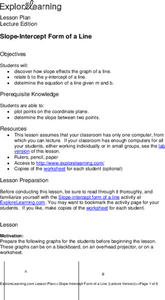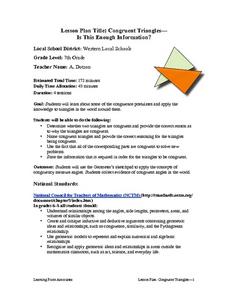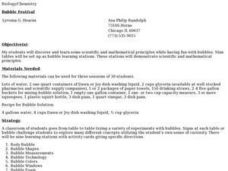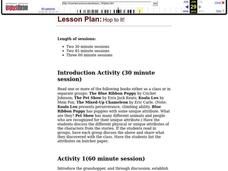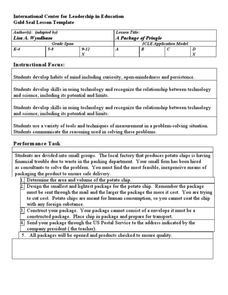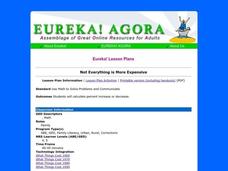Curated OER
Would You Believe Your Eyes?
Students study the parts and functions of the human eye. They create dodecagons which are twelve-sided figures with twelve equal angles and share these with the class so that each student can begin to see how many different illusions can...
Curated OER
Exploring Area and Perimeter
Two students are blindfolded and each receives a cardboard square, one with pompoms glued around the edge and one with pompoms glued all over the surface. They identify what they feel. The class discusses perimeter and area of polygons....
Curated OER
Patterns
Students create and extend patterns. In this pattern lesson, students learn to identify patterns using multiple senses. Students work at centers in small groups to explore and extend their understanding of patterns.
Curated OER
The Life Cycle of the Mealworm
Fourth graders provide a habitat for live mealworms and observe their life cycle. In this animal life cycle and scientific inquiry lesson, 4th graders create a habitat for a live mealworm and observe and record related data as it grows....
Curated OER
Follow the Falling Meteorite
Students use triangulation method to locate meteorite landing site on the map. In this earth science instructional activity, students participate in a meteorite treasure hunt set up by the teacher. They explain how this method is used by...
Curated OER
Standard Form of Equations
Learners complete the square and identify different parts of a quadratic equation. In this algebra lesson, pupils graph conics using the TI calculator. They rewrite equations by completing the square.
Curated OER
Our School - Our Trees
Sixth graders observe school ground trees planted nearly 3 decades ago. For this ecology activity, 6th graders examine a group of trees planted near their campus and measure the diameter, circumference and growth of the tree...
Curated OER
Slope-Intercept Form of a Line
Students determine how the slope affects the graph of a line. They relate "b" to the "y"-intercept of a line and solve the equation of a line given "m" and "b." They are given scenarios and possible answers to which they explain why or...
Curated OER
Exploring Tessellations
Fifth graders examine how to make tessellations. For this tessellation lesson, 5th graders review the meaning of the word "polygon" while the teacher shows them various examples. They practice making tiling patterns or tessellation's...
Curated OER
Tessellating Ceiling Tiles
Students transform polygons. In this tessellating lesson, students design a picture containing a translation and a rotation. They create a template of a translation or a rotation. Students tessellate and decorate a...
Curated OER
Congruent Trianges - Is This Enough Information?
Seventh graders determine whether two triangles are congruent and provide an explanation to why they are not. They apply concepts of measurement of angles and collect evidence of congruent angles in the world.
Curated OER
Bubble Festival
Students practice scientific inquiry while learning about bubbles. In this instructional activity about bubbles, students explore characteristics of bubbles. Students move through nine different "bubble" stations following directions and...
Curated OER
A Polynomial Quilt
Tenth graders create polynomial quilts. In this polynomials lesson, 10th graders use concrete models, such as construction paper, to create various shapes described. Students use the FOIL method to multiply terms and to get a square...
Curated OER
The Sounds of Change
Learners recognize that music brings out feelings and emotions in people. In this music themes instructional activity, students explore the relationships between culture and music. Learners answer questions about favorite choices in music.
Curated OER
Related Rates
Twelfth graders rewrite word problems using equations. In this calculus activity, 12th graders solve real world situation using the derivative. They solve problems on rate, and distance.
Curated OER
What's the Difference?
In this finding the difference in sums instructional activity, 1st graders look over two boxes of numbers and circle the pairs of numbers in each box that have a difference of 9 in the first one and 6 in the second one.
Curated OER
Hop To It!
Young scholars explore grasshoppers. In this grasshoppers lesson, students measure the jumping distance of live grasshoppers. Young scholars then record the jumping distance of people in their group. Students record the...
Curated OER
Show Me The Money!
Students select which bank would best meet their needs. In this lesson on personal banking, students write a summary stating which bank and bank accounts best suit their own needs.
Curated OER
Dolphins
Students explore sea life. For this cross curriculum fine arts, science, and P.E. "dolphins" lesson, students sing songs and play games about dolphins, perform water experiments, create mosaics, and use their five senses to explore sand...
Curated OER
Story Stretching: Tall Tales in North America
Students are introduced to tall tales. In this introductory tall tales unit, students explore the tall tales of Casey Jones and Johnny Appleseed. This unit includes many interdisciplinary lessons including graphing skills and geography.
Curated OER
A Package of Pringle
Here is a problem-solving lesson that has learners take the role of a packaging expert to design an inexpensive means of packaging a potato chip. It could benefit from having more specific detail about the lesson itself, but it does make...
Curated OER
Not Everything Is More Expensive
High schoolers investigate the concept of using different types of presentations to help solve mathematical problems. They research the use of illustrations to help understand data and its interpretation in a graphing format. Students...
Curated OER
Finding Remainders in Pascal's Triangle
Students use clock arithmetic to find remainders. In this patterns in math lesson, students explore the relationship between clock arithmetic and remainders using a computer applet. Students also identify patterns in Pascal's triangle...
Curated OER
The Quadratic Formula
Students solve quadratic function by completing the square. In this algebra lesson, students use the quadratic formula to factor quadratics and find the roots. They graph the parabola and identify its properties.


